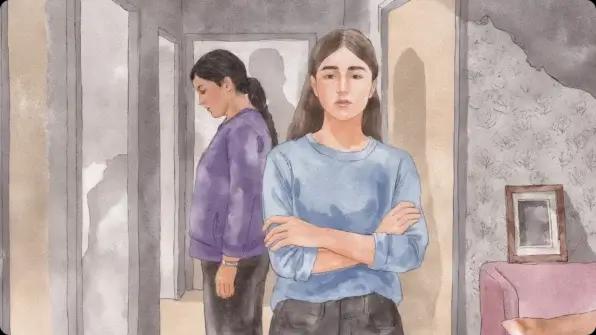I’ve seen a lot of emotional wounds in my therapy practice. One type of wound is religious trauma. The scars left by harmful religious environments and spiritual abuse can affect every aspect of a person’s life.
Allow me to introduce myself: I’m Rychel Johnson, a Master’s level therapist in private practice. I work with people who have anxiety and depression and have for over a decade.
Through this article, I’ll share my insights and approaches to treating religious trauma.
My goal is to shed light on this often-overlooked area of mental health. You will learn more about religious trauma. I hope you will leave with a better understanding of practical strategies for those affected.
Religious trauma explained
My therapy clients come from a wide range of backgrounds. Their experiences in religious settings can contribute to their worldview and cause trauma.
Religious trauma is an often misunderstood form of trauma. It challenges the sense of self. Relationships are disrupted. Emotional and psychological stress is apparent. Untangling the complex web of fear, guilt, shame, and loss is daunting.
So, what is religious trauma? This type of trauma can stem from various situations.
Not all religious settings are harmful. However, abusive practices or abuse of authority can happen. Harmful teachings or leadership can cause a ripple of hurt for a person.
In a nutshell, religious trauma is a form of complex trauma. It occurs when religious experiences create psychological or emotional distress.
Studies have even demonstrated a link between religious trauma and eating disorders.
Settings where religious trauma may develop include:
- Churches or youth groups
- Synagogues
- Buddhist temples
- Mosque
- Other religious education settings
Some religious trauma examples include:
- Manipulation
- Control by limiting a person’s ability to question religious beliefs or practices
- Exploitation or financial abuse under the guise of spiritual guidance
- Being ostracized from a religious community for questioning beliefs
Religious trauma test
While not a diagnostic tool, it’s helpful to ask yourself questions to see if you’ve experienced religious trauma.
Take this “Do I have religious trauma” quiz to help determine:
- Have you ever felt intense fear or anxiety related to religious teachings or beliefs?
- Have you experienced shame or guilt due to not living up to religious expectations or standards?
- Do you feel a sense of worthlessness or inadequacy because of religious teachings or doctrines?
- Have you been subjected to physical, emotional, or psychological abuse in the name of religion?
- Do you struggle with forming healthy relationships or trusting others due to past religious experiences?
- Have you experienced a loss of identity or difficulty finding meaning outside of your religious upbringing?
Scoring this quiz is simple — more “yes” answers = a higher likelihood that religious trauma may be affecting you.

Spiritual abuse vs. religious trauma
So, spiritual abuse and religious trauma are related but distinct concepts, often overlapping in their impact.
Actually, spiritual abuse is one of the types of religious trauma.
It involves using spiritual or religious authority to manipulate, control, or harm. It can occur within any religious or spiritual context.
Religious leaders, community members, or even family members can cause this harm.
Also, religious trauma refers to the psychological and emotional harm that arises from harmful religious experiences. It can be a result of spiritual abuse.
In the table below, spiritual abuse and religious trauma are outlined with examples:
| Spiritual Abuse | Religious Trauma |
| Using religious teachings or authority to control others’ behavior or beliefs | PTSD-like symptoms like flashbacks, nightmares, and hypervigilance |
| Leaders who demand unquestioning obedience and use their position to exploit or oppress followers | Struggling to reconcile religious teachings with personal experiences or values |
| Using fear of divine punishment, hell, or ostracism to enforce compliance | Feeling disconnected from one’s sense of self due to religious teachings or experiences |
| Inducing feelings of guilt, shame, or worthlessness through religious teachings or practices | Suffering from anxiety, depression, guilt, or shame related to religious beliefs or experiences |
| Cutting off individuals from outside influences or non-believers to maintain control | Difficulty maintaining relationships with family or friends who remain within the religious context and feeling isolated |
| Using a person for personal gain (financial, sexual, etc.) under the guise of religious duty | Intense fear of punishment or divine retribution and guilt over perceived moral failings |
17 signs of religious trauma
I’ve learned from my work with therapy clients that some signs are apparent. Other religious trauma signs or symptoms are trickier to tease out. Religious trauma symptoms and signs can manifest in various ways.
The following are signs I’ve personally observed in my practice. These symptoms reflect the profound impact that harmful religious experiences can have:
- Persistent anxiety – The person has ongoing feelings of fear and worry connected to religious beliefs or teachings.
- Depression – The person has feelings of deep sadness or hopelessness.
- Constant feelings of guilt—The person experiences overwhelming guilt or shame. These feelings are related to perceived sins or moral failing in religious teachings.
- Intrusive thoughts – The person has distressing thoughts related to religious trauma or past experiences.
- Flashbacks and nightmares – The person has vivid memories or nightmares related to traumatic religious experiences.
- Avoidance – The person avoids religious or spiritual contexts or discussions that trigger relevant distress.
- Hypervigilance – The person is overly alert or sensitive to potential threats or triggers.
- Isolation – The person may withdraw from social interactions, particularly involving religious communities.
- Anger and irritability – The person has a short fuse or is easily irritated.
- Relationship strain – The person has difficulty maintaining or repairing relationships.
- Difficulty trusting – The person has challenges trusting authority figures or institutions from past betrayals or abuses.
- Loss of community
- Sleep disturbances
- Crisis of faith – The person questions or rejects previously held religious beliefs or practices.
- Reactive abuse occurs when a person feels pressure and unintentionally acts out. Despite being unintentional, this reaction is perceived as angry or abusive.
- Self-blame – The person places undue blame on themselves for past religious experiences or perceived shortcomings.
- Difficulty forming new beliefs – The person struggles to develop or embrace new beliefs or spiritual practices.

Religious Trauma Syndrome
Everyone has a unique set of symptoms of religious trauma. The term Religious Trauma Syndrome describes common experiences.
Religious trauma syndrome (RTS) is not in the DSM-5 as an official mental health diagnosis. However, mental health can be deeply impacted by religious trauma. It’s essential to validate people’s experiences.
Symptoms of RTS are recognizable among people who are familiar with religious trauma. These symptoms impact several areas of functioning, including the following:
- Cognitive – Feeling confused or unable to think critically. The person may have negative beliefs about their abilities. They have perfectionist tendencies and black-and-white thinking. Decision-making is a challenge.
- Emotional – Mental health symptoms like depression and anxiety arise. The person may feel anger, grief, and loneliness. Feeling self-hatred could be a part of this experience.
- Social – The person feels a loss of a social network. Family structure or hierarchy may change significantly. Social awkwardness could be expected as a person adjusts.
- Cultural – Feeling “culture shock” from unfamiliarity with a world outside of the religion. This experience involves difficulty feeling a sense of belonging outside the religious setting.
Fortunately, healing from religious trauma syndrome is possible. While seeking help is important, self-compassion is also crucial. Focus on fostering kindness toward yourself during the healing process.
Do you know that emotional intelligence is connected to healing? Try a Breeze test today to measure your EQ.
How long does religious trauma last?
Religious trauma can be a long-term process. While some people experience significant improvements quickly, others find it takes years.
The severity and duration of the traumatic experiences play a role. Personal resilience is also relevant. Feeling like someone believes you go a long way.
But religious trauma in childhood may have happened years ago. It might feel like healing is impossible.
Thankfully, with the right tools and support, you can be on your way to healing right away.
Factors that can influence how long religious trauma lasts may include:
- Severity and duration of trauma – More severe and prolonged traumatic experiences often lead to longer recovery times.
- Individual resilience – Personal coping mechanisms, emotional strength, and previous experiences with trauma can influence how long symptoms last.
- Support systems – A strong network of friends, family, or support groups can significantly impact healing.
- Therapeutic interventions – Access to effective therapy and counseling can accelerate recovery.
- Personal effort and engagement – The individual’s commitment to healing, learning, and personal growth plays a critical role.
Some people may experience relief from symptoms within months to a year. Access to adequate support significantly impacts the healing timeline.
It’s common for a religious trauma survivor to experience intense emotions initially. Psychological symptoms may also surface. Realizing that your experience is religious trauma can be jarring initially.
What causes religious trauma?
If you’re here reading this article, you likely have a pretty good idea of what caused your religious trauma. Organizations and spiritual leadership can be problematic for us at times.
An insidious source of religious trauma is your family of origin. It can be mind-boggling to realize your trauma comes from your home.
Religious trauma from parents may be a significant piece of your religious trauma puzzle.
Within families, there is direct or perceived pressure to adhere to religious norms and practices.
Over time, you’ve likely developed personal beliefs and values. If these do not align with the beliefs and values of your family, conflict may arise.
Childhood religious trauma can be linked to parental emotional abuse. When a parent is the source of religious trauma, it can further complicate healing.
Is childhood trauma part of your story? Take a Breeze test today to find out how it may be impacting you.
Steps to take after religious trauma
Religious trauma is a lot to wrap your head around. You may be just now starting to peel back the layers of what happened to you.
First, you must acknowledge that what you went through was traumatic. Validate your feelings and understand that your pain is real and legitimate.
Therapy can help. Find a therapist or counselor who can guide you in your healing journey. They can help you process feelings of guilt and shame.
As you move forward, more steps can include:
- Set boundaries with people or situations that trigger your trauma
- Connect with others who have had similar experiences online or in person
- Explore who you are outside of your religious upbringing with activities that you enjoy
- Find helpful quotes about religious trauma
- Find healthy ways to cope with stress and anxiety: mindfulness, deep breathing exercises, and creative outlets can help
- Learn: reading books about religious trauma can help you feel validated
- If you’re open to it, explore different spiritual or philosophical beliefs. You can find a path that provides peace and meaning.
Most importantly, be patient and compassionate with yourself. Healing from religious trauma is a gradual process.
Disclaimer
This article is for general informative and self-discovery purposes only. It should not replace expert guidance from professionals.
Any action you take in response to the information in this article, whether directly or indirectly, is solely your responsibility and is done at your own risk. Breeze content team and its mental health experts disclaim any liability, loss, or risk, personal, professional, or otherwise, which may result from the use and/or application of any content.
Always consult your doctor or other certified health practitioner with any medical questions or concerns
Breeze articles exclusively cite trusted sources, such as academic research institutions and medical associations, including research and studies from PubMed, ResearchGate, or similar databases. Examine our subject-matter editors and editorial process to see how we verify facts and maintain the accuracy, reliability, and trustworthiness of our material.
Was this article helpful?






